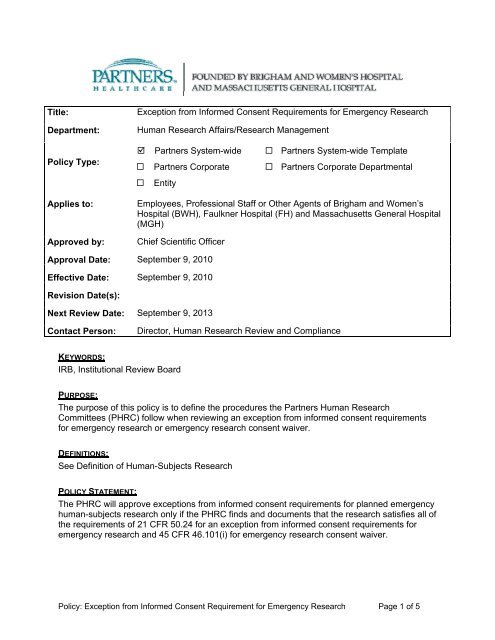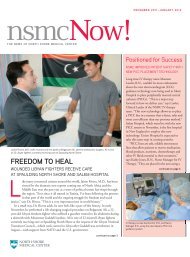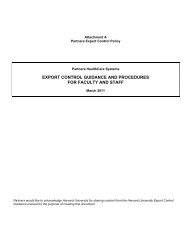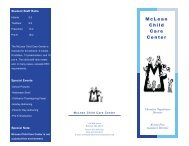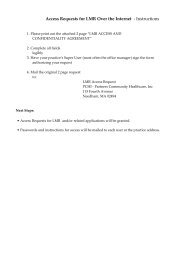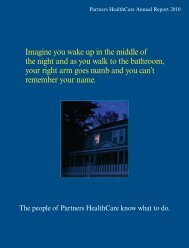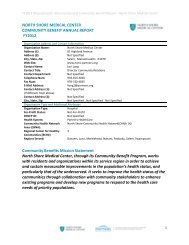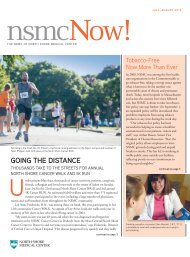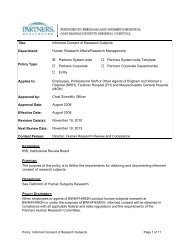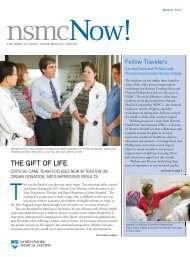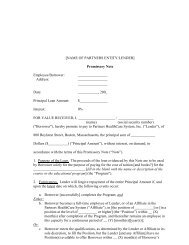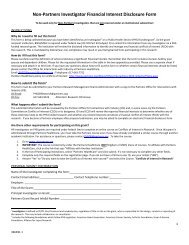Exception from Informed Consent Requirements for Emergency
Exception from Informed Consent Requirements for Emergency
Exception from Informed Consent Requirements for Emergency
You also want an ePaper? Increase the reach of your titles
YUMPU automatically turns print PDFs into web optimized ePapers that Google loves.
Title:Department:Policy Type:<strong>Exception</strong> <strong>from</strong> <strong>In<strong>for</strong>med</strong> <strong>Consent</strong> <strong>Requirements</strong> <strong>for</strong> <strong>Emergency</strong> ResearchHuman Research Affairs/Research Management Partners System-wide Partners System-wide Template Partners Corporate Partners Corporate Departmental EntityApplies to:Approved by:Employees, Professional Staff or Other Agents of Brigham and Women’sHospital (BWH), Faulkner Hospital (FH) and Massachusetts General Hospital(MGH)Chief Scientific OfficerApproval Date: September 9, 2010Effective Date: September 9, 2010Revision Date(s):Next Review Date: September 9, 2013Contact Person:Director, Human Research Review and ComplianceKEYWORDS:IRB, Institutional Review BoardPURPOSE:The purpose of this policy is to define the procedures the Partners Human ResearchCommittees (PHRC) follow when reviewing an exception <strong>from</strong> in<strong>for</strong>med consent requirements<strong>for</strong> emergency research or emergency research consent waiver.DEFINITIONS:See Definition of Human-Subjects ResearchPOLICY STATEMENT:The PHRC will approve exceptions <strong>from</strong> in<strong>for</strong>med consent requirements <strong>for</strong> planned emergencyhuman-subjects research only if the PHRC finds and documents that the research satisfies all ofthe requirements of 21 CFR 50.24 <strong>for</strong> an exception <strong>from</strong> in<strong>for</strong>med consent requirements <strong>for</strong>emergency research and 45 CFR 46.101(i) <strong>for</strong> emergency research consent waiver.Policy: <strong>Exception</strong> <strong>from</strong> <strong>In<strong>for</strong>med</strong> <strong>Consent</strong> Requirement <strong>for</strong> <strong>Emergency</strong> Research Page 1 of 5
PROCEDURES:Investigators requesting an exception or waiver <strong>from</strong> the requirement to obtain in<strong>for</strong>med consent<strong>for</strong> planned emergency research must provide sufficient in<strong>for</strong>mation in the protocol submission<strong>for</strong> the PHRC to find and determine whether the research satisfies all of the requirements of 21CFR 50.54 <strong>for</strong> an exception <strong>from</strong> in<strong>for</strong>med consent requirements <strong>for</strong> emergency research and45 CFR 46.101(i) <strong>for</strong> emergency research consent waiver.The emergency research consent waiver does not apply to research involving fetuses, pregnantwomen, and human in vitro fertilization (Subpart B of 45 CFR 46) and research involvingprisoners (Subpart C of 45 CFR 46).For the purposes of the emergency research consent waiver “family member” means any one ofthe following legally competent persons: spouses; parents; children (including adoptedchildren); brothers, sisters, and spouses of brothers and sisters; and any individual related byblood or affinity whose close association with the subject is the equivalent of a familyrelationship.Protocol Submission <strong>Requirements</strong>When submitting research requesting an exception <strong>from</strong> in<strong>for</strong>med consent requirements <strong>for</strong>emergency research, the investigator must address each of the required PHRC findings anddeterminations in the protocol submission, specifically: Justification <strong>for</strong> the research; Justification <strong>for</strong> waiver of in<strong>for</strong>med consent; Relation of risks to anticipated benefits; <strong>In<strong>for</strong>med</strong> consent procedures and an in<strong>for</strong>med consent document consistent with 21CFR 50.25 and 45 CFR 46.116; Impracticability of conducting the research without the waiver of in<strong>for</strong>med consent; Therapeutic window and consent process; Plan <strong>for</strong> community consultation; Plan <strong>for</strong> public disclosure prior to and after completion of the clinical investigation; Establishment of an independent data monitoring committee to oversee the clinicalinvestigation; Procedures followed when attempting to contact a family member who is not a legallyauthorized representative, within the therapeutic window and asking whether he or sheobjects to the subject’s participation in the clinical investigation when obtaining in<strong>for</strong>medconsent is not feasible and a legally authorized representative is not reasonablyavailable; Procedures to in<strong>for</strong>m, at the earliest feasible opportunity each subject, or if the subjectremains incapacitated, a legally authorized representative of the subject, or if such arepresentative is not reasonably available, a family member, of the subject’s inclusion inthe clinical investigation, the details of the investigation and other in<strong>for</strong>mation containedin the in<strong>for</strong>med consent document, that he or she may discontinue the subject’sparticipation at any time without penalty or loss of benefits to which the subject is otherentitled;Procedures to in<strong>for</strong>m the subject should the subject’s condition improve; andIf feasible, procedures to provide the subject’s legally authorized representative or familymember with in<strong>for</strong>mation about the clinical investigation should the subject die be<strong>for</strong>e alegally authorized representative or family member can be contacted.PHRC Findings and DeterminationsPolicy: <strong>Exception</strong> <strong>from</strong> <strong>In<strong>for</strong>med</strong> <strong>Consent</strong> Requirement <strong>for</strong> <strong>Emergency</strong> Research Page 2 of 5
The PHRC must make and document the following findings and determinations:1. Conducting the research is justified because: The human subjects are in a life threatening situation; Available treatments are unproven or unsatisfactory; and The collection of valid scientific evidence, which may include evidence obtainedthrough randomized placebo-controlled investigations, is necessary to determine thesafety and effectiveness of particular interventions.2. Waiving in<strong>for</strong>med consent is justified because: The subjects will not be able to give in<strong>for</strong>med consent as a result of their medicalcondition; The intervention under investigation must be administered be<strong>for</strong>e consent <strong>from</strong> thesubjects’ legally authorized representative is feasible; and There is no way to identify prospectively the individuals likely to become eligible <strong>for</strong>participation in the clinical investigation.3. The risks are reasonable in relation to the anticipated benefits because: Subjects are facing a life-threatening situation that necessitates intervention; Approval animal and other preclinical studies have been conducted, and thein<strong>for</strong>mation derived <strong>from</strong> those studies and related evidence support the potential <strong>for</strong>the intervention to provide a direct benefit to the individual subjects; and Risks associated with the investigation are reasonable in relation to what is knownabout the medical condition of the potential class of subjects, the risks and benefitsof standard therapy, if any, and what is known about the risks and benefits of theproposed intervention or activity.4. The clinical investigation could not practicably be carried out without the waiver.5. The investigational plan defines the length of the potential therapeutic window based onscientific evidence, and the investigator has committed to attempting to contact a legallyauthorized representative contacted <strong>for</strong> consent within the window rather than proceedingwithout consent. The investigator will summarize ef<strong>for</strong>ts made to contact legally authorizedrepresentatives and make this in<strong>for</strong>mation available to the IRB at the time of continuingreview.6. The IRB has reviewed and approved in<strong>for</strong>med consent procedures and an in<strong>for</strong>med consentdocument consistent with 21 CFR 50.25 and 45 CFR 46.116. These procedures and thein<strong>for</strong>med consent document are to be used with subjects or their legally authorizedrepresentatives in situations where use of such procedures and documents is feasible. TheIRB has reviewed and approved procedures and in<strong>for</strong>mation to be used when providing anopportunity <strong>for</strong> a family member to object to a subject’s participation in the clinicalinvestigation consistent.7. The following additional protections of the rights and welfare of subjects will be provided: Consultation (including, where appropriate, consultation carried out by the IRB) withrepresentatives of the communities in which the clinical investigation will beconducted and <strong>for</strong>m which the subjects will be drawn;Policy: <strong>Exception</strong> <strong>from</strong> <strong>In<strong>for</strong>med</strong> <strong>Consent</strong> Requirement <strong>for</strong> <strong>Emergency</strong> Research Page 3 of 5
Public disclosure to the community in which the clinical investigation will beconducted and <strong>from</strong> which the subjects will be drawn, prior to initiation of the clinicalinvestigation, or plans <strong>for</strong> the investigations and its risks and expected benefits.Public disclosure of sufficient in<strong>for</strong>mation following completion of the clinicalinvestigation to apprise the community and researchers of the study, including thedemographic characteristics of the research population, and its results;Establishment of an independent data monitoring committee to exercise oversight ofthe clinical investigation; andIf obtaining in<strong>for</strong>med consent is not feasible and a legally authorized representativeis not reasonably available, the investigator has committed, if feasible, to attemptingto contact within the therapeutic window the subject’s family member who is not alegally authorized representative, and asking whether he or she objects to thesubject’s participation in the clinical investigation The investigator will summarizeef<strong>for</strong>ts made to contact family members and make this in<strong>for</strong>mation available to theIRB at the time of continuing review.Additional PHRC ResponsibilitiesThe PHRC is responsible <strong>for</strong> ensuring that procedures are in place to in<strong>for</strong>m, at the earliestfeasible opportunity each subject, or if the subject remains incapacitated, a legally authorizedrepresentative of the subject, or if such a representative is not reasonably available, a familymember, of the subject’s inclusion in the clinical investigation, the details of the investigationand other in<strong>for</strong>mation contained in the in<strong>for</strong>med consent document, The PHRC must alsoensure that there is a procedure to in<strong>for</strong>m the subject, or if the subject remains incapacitated, alegally authorized representative of the subject, or if such a representative is not reasonablyavailable, a family member, that he or she may discontinue the subject’s participation at anytime without penalty or loss of benefits to which the subject is otherwise entitled. If the legallyauthorized representative or family member is told about the clinical investigation and thesubject’s condition improves, the subject is also to be in<strong>for</strong>med as soon as feasible. If a subjectis entered into a clinical investigation with waived consent and the subject dies be<strong>for</strong>e a legallyauthorized representative or family member can be contacted, in<strong>for</strong>mation about the clinicalinvestigation is to be provided to the subject’s legally authorized representative or familymember, if feasible.Record KeepingThe PHRC determinations required above must be retained by the PHRC <strong>for</strong> at least 3 yearsafter completion of the clinical investigation, and the records will be accessible <strong>for</strong> inspectionand copying by the FDA.Investigational New Drug (IND) or Investigational Device Exemption (IDE)Protocols involving an exception to the in<strong>for</strong>med consent requirement under FDA regulations50.24 must be per<strong>for</strong>med under a separate IND or IDE that clearly identifies such protocols asprotocols that may include subjects whoa are unable to consent. The submission of thoseprotocols in a separate IND/IDE is required even if an IND <strong>for</strong> the same drug product or an IDE<strong>for</strong> the same device already exists. Applications <strong>for</strong> investigations involving an exception to thein<strong>for</strong>med consent requirement may not be submitted as amendments to an existing IND/IDE.Notifying Investigators and FDA of Disapproval of a Clinical Investigation Involving <strong>Exception</strong><strong>from</strong> <strong>In<strong>for</strong>med</strong> <strong>Consent</strong> <strong>Requirements</strong> <strong>for</strong> <strong>Emergency</strong> ResearchIf the PHRC disapproves a clinical investigator because the investigation does not meet thecriteria in the exception requirement above, the PHRC must document its findings and providethese findings promptly in writing to the investigator and to the sponsor of the investigation. ThePolicy: <strong>Exception</strong> <strong>from</strong> <strong>In<strong>for</strong>med</strong> <strong>Consent</strong> Requirement <strong>for</strong> <strong>Emergency</strong> Research Page 4 of 5
sponsor of the clinical investigation must promptly disclose this in<strong>for</strong>mation to FDA and to thesponsor’s clinical investigators who are participating or are asked to participate in this or asubstantially equivalent clinical investigation of the sponsor, and to other IRB’s that have been,or are, asked to review this or a substantially equivalent clinical investigation by that sponsor.OTHER APPLICABLE PARTNERS HEALTHCARE POLICIES:<strong>In<strong>for</strong>med</strong> <strong>Consent</strong> of Research SubjectsREFERENCE:45 CFR 4621 CFR 50, 56, 312, 812OHRP Report <strong>In<strong>for</strong>med</strong> <strong>Consent</strong> <strong>Requirements</strong> in <strong>Emergency</strong> ResearchDEVELOPMENT AND CONSULTATIONHuman Research OfficeReviewed by: Original Review Date: Revision Approval Dates:Policy: <strong>Exception</strong> <strong>from</strong> <strong>In<strong>for</strong>med</strong> <strong>Consent</strong> Requirement <strong>for</strong> <strong>Emergency</strong> Research Page 5 of 5


